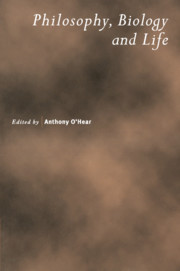Book contents
- Frontmatter
- Contents
- Preface
- Notes on Contributors
- Transcending the Emergence/Reduction Distinction: The Case of Biology
- Other Histories, Other Biologies
- The Ontogenesis of Human Identity
- Souls, Minds, Bodies and Planets
- Evo-devo: A New Evolutionary Paradigm
- Is Drift a Serious Alternative to Natural Selection as an Explanation of Complex Adaptive Traits?
- Evolution and Aesthetics
- The Problems of Biological Design
- Are there Genes?
- Folk Psychology and the Biological Basis of Intersubjectivity
- The Loss of Rational Design
- Under Darwin's Cosh? Neo-Aristotelian Thinking in Environmental Ethics
- The Cultural Origins of Cognitive Adaptations
- Name Index
Souls, Minds, Bodies and Planets
Published online by Cambridge University Press: 07 May 2010
- Frontmatter
- Contents
- Preface
- Notes on Contributors
- Transcending the Emergence/Reduction Distinction: The Case of Biology
- Other Histories, Other Biologies
- The Ontogenesis of Human Identity
- Souls, Minds, Bodies and Planets
- Evo-devo: A New Evolutionary Paradigm
- Is Drift a Serious Alternative to Natural Selection as an Explanation of Complex Adaptive Traits?
- Evolution and Aesthetics
- The Problems of Biological Design
- Are there Genes?
- Folk Psychology and the Biological Basis of Intersubjectivity
- The Loss of Rational Design
- Under Darwin's Cosh? Neo-Aristotelian Thinking in Environmental Ethics
- The Cultural Origins of Cognitive Adaptations
- Name Index
Summary
Separate Substances?
What does it mean to say that we have got a mind-body problem? Do we need to think of our inner and outer lives as two separate items between which business must somehow be transacted, rather than as aspects of a whole person?
Dualist talk assumes that we already have before us two separate things which we don't see how to connect. This is a seventeenth-century way of seeing the problem. It is tied to views in physics and many other topics that we no longer hold.
‘Mind’ and ‘matter’, conceived as separate in this way, are extreme abstractions. These are terms that were deliberately designed by thinkers like Descartes to be mutually exclusive and incompatible, which is why they are so hard to bring together now. In Descartes’ time, their separation was intended as quarantine to separate the new, burgeoning science of physics from views on other matters with which it might clash. It was also part of a much older, more general attempt to separate Reason from Feeling and establish Reason as the dominant partner, Feeling being essentially just part of the body. That is why, during the Enlightenment, the word ‘soul’ has been gradually replaced by ‘mind’, and the word ‘mind’ has been narrowed from its ordinary use (‘I don't mind’ … ‘I've a good mind to do it’) to a strictly cognitive meaning.
- Type
- Chapter
- Information
- Philosophy, Biology and Life , pp. 83 - 104Publisher: Cambridge University PressPrint publication year: 2005



